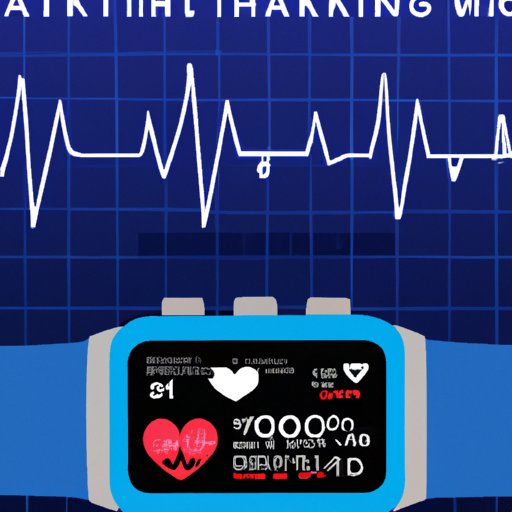Introduction
Your heart rate is an essential indicator of your overall health. It is a measure of how fast your heart is beating and can provide insight into your fitness level, stress levels, and risk for developing cardiovascular diseases. Knowing what a healthy heart rate is, as well as how to monitor it, can help you take steps towards improving your physical and mental health.
Heart Rate Basics: Understanding What a Healthy Heart Rate Is
According to the American Heart Association, the normal resting heart rate range for adults is between 60 and 100 beats per minute (bpm). This means that if your heart rate is lower than 60 bpm or higher than 100 bpm when you are at rest, it may be a sign of an underlying medical condition.
A number of factors can influence your heart rate. These include age, gender, activity level, diet, and medications. Additionally, your heart rate can be affected by certain medical conditions such as high blood pressure, diabetes, and thyroid problems.

Monitoring Your Heart Rate for Optimal Health
Knowing your heart rate can be beneficial for both your physical and mental health. By monitoring your heart rate, you can identify any abnormal patterns, which can help you make lifestyle changes to improve your overall health. In addition, tracking your heart rate can help you measure your fitness level and performance, allowing you to adjust your exercise routine accordingly.
To calculate your maximum heart rate, subtract your age from 220. For example, if you are 30 years old, your maximum heart rate would be 190 bpm. Your target heart rate is usually between 50-85% of your maximum heart rate. To get the most out of your workout, it is important to stay within this range.

The Benefits of Knowing Your Heart Rate
Knowing your heart rate can provide several benefits. Firstly, it can help you optimize your exercise performance. Research has shown that exercising at higher intensities can lead to greater improvements in aerobic capacity, muscle strength, and body composition 1. By monitoring your heart rate during exercise, you can ensure that you are pushing yourself to the right intensity level for optimal results.
In addition, monitoring your heart rate can help reduce your risk of developing cardiovascular diseases. According to a study published in the European Journal of Preventive Cardiology, those who monitored their heart rates regularly had a significantly lower risk of developing coronary artery disease 2. This suggests that heart rate monitoring can be a valuable tool for preventing and managing heart diseases.
How to Use a Heart Rate Monitor to Track Your Progress
Using a heart rate monitor is a convenient way to keep track of your heart rate during exercise and at rest. When choosing a monitor, it’s important to consider features such as accuracy, battery life, and ease of use. Once you have selected a monitor, setting it up and using it is relatively straightforward.
Most heart rate monitors come with an app that allows you to track your heart rate over time. This data can be useful for identifying patterns in your heart rate and making adjustments to your diet, exercise routine, and lifestyle accordingly.
What Factors Affect Your Heart Rate?
Exercise intensity is one of the most significant factors that can affect your heart rate. As your intensity increases, so does your heart rate. Diet is also a key factor. Eating a balanced diet rich in whole grains, fruits, vegetables, and lean proteins can help maintain a healthy heart rate. Finally, stress can cause your heart rate to increase. Identifying and managing sources of stress can help keep your heart rate in the normal range.

Foods to Help Maintain a Healthy Heart Rate
Eating a nutritious diet is essential for maintaining a healthy heart rate. Whole grains such as oats, quinoa, and barley are packed with fiber and essential vitamins and minerals. Fruits and vegetables are also important for maintaining a healthy heart rate, as they are rich in antioxidants and other nutrients. Finally, lean proteins such as fish, chicken, and eggs can help keep your heart rate in check.
Conclusion
Maintaining a healthy heart rate is essential for optimal health. Knowing your heart rate and understanding how it is affected by exercise, diet, and stress can help you take steps towards improving your physical and mental wellbeing. Using a heart rate monitor is an easy and convenient way to track your progress and make adjustments accordingly. With these tips, you can stay on top of your heart health and enjoy the many benefits that come with it.
(Note: Is this article not meeting your expectations? Do you have knowledge or insights to share? Unlock new opportunities and expand your reach by joining our authors team. Click Registration to join us and share your expertise with our readers.)
